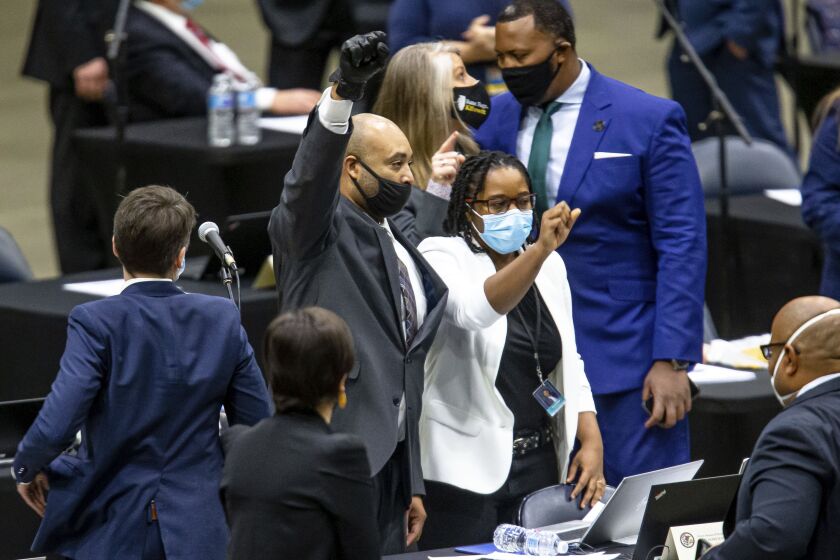Many of us were sickened by the video of Chicago social worker Anjanette Young, handcuffed and naked, surrounded and harassed by Chicago police officers who had mistakenly raided her home. After the video ignited public outrage, the officers were held accountable and the process leading to the raid was reviewed.
But it took a graphic video of the officers’ treatment of a totally innocent woman before there was any recognition or acknowledgment from the police that accountability and change are necessary. Unfortunately, the lesson has not lasted.
Last week, the Illinois General Assembly approved a modest measure to reform the criminal justice system and establish more accountability for police. Since then, the response from the public voices of law enforcement has been predictable and pitiful.
The leader of Chicago’s police union — a man who had recently defended the actions of the angry mob that attacked the U.S. Capitol in Washington — said the bill “handed the keys” to criminals.
Clever, but wrong.
The leader of a national law enforcement organization, in an opinion essay in the Sun-Times, argued that the legislation was “rushed through.” He called it a “solution in search of a problem.”
A suburban county sheriff claimed that the bill amounted to the “dismantling of public safety” in Illinois, while other critics screamed that our legislation would “de-fund” the police.
All of these attacks were predictable. And all of them are just plain wrong.
One of the most insulting accusations is that the bill was somehow foisted upon the law enforcement community in just a few hours. It is a great story, but just that — a story. The bill was the patient result of months of hearings and dialogue with interested parties, efforts that began last summer after the murder of George Floyd.
The protests and sense of outrage at the murder of Mr. Floyd — and too many other similar events to enumerate — convinced me and my colleagues in the Legislative Black Caucus that change was needed to increase accountability for police across Illinois. And we needed to address systemic inequities in criminal justice.
When the Black Caucus launched the “pillars of change” we wanted to see, police and criminal justice system reform were at the top of our list. And so we held months of hearings, with dozens of witnesses from law enforcement, academia, state and local government and advocacy groups. Those hearings — in addition to what we heard from our constituents across the state about the need for change — convinced us that we needed to act at the first possible opportunity, which turned out to be last week.
We addressed specific proposals for enhancing police accountability, and we welcomed proposals from everyone for language to include in the bill. Every single thing that ended up in the bill had been discussed and negotiated since June.
So much for an alleged “rush.”
The details of the legislation, moreover, put the lie to accusations that the measure is a victory for criminals or somehow will diminish public safety. Among the bill’s main elements are:
· A provision that requires all police officers in Illinois to be trained to a standard use of force policy. The provision assures that all police will know the rules for how to interact with the public.
· The lifting of an antiquated measure that forces residents in Illinois to sign a sworn affidavit in order to file a complaint against a police officer. The threat of being prosecuted for making a complaint if even one material fact is not accurate has discouraged many people from leveling legitimate charges against officers who have abused their authority.
· A measure that assures that people suspected of a crime have access to the use a phone before police questioning. It’s interesting that the police would object to this, given that many police unions have fought for hours of delay before an officer can be questioned about using excessive use of force.
· A shift in approach on criminal justice, moving away from long, mandated sentences to an approach that allows prisoners to carve time off of sentences when they participate in rehabilitation and education programs.
· And a measure that reforms the cash bail system in Illinois, assuring that we are holding people in pre-trial detention only because they pose a threat to our communities, not because they are too poor to make bail.
These common-sense measures were the result of hard-fought legislative negotiation. No one got everything they wanted. But for law enforcement to act now as though nothing should have changed is just wrong. And it must be called out.
Justin Slaughter represents the 27th district in the Illinois House.
Send letters to letters@suntimes.com.





